#Reparations for Enslavement
Explore tagged Tumblr posts
Text
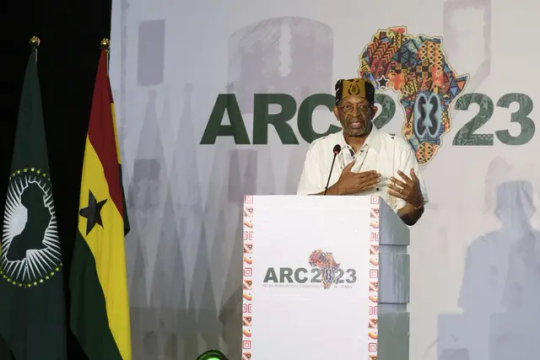
We “must confront and can no longer ignore,” the issue of reparations for slavery, said Ghana’s president Nana Addo Akufo-Addo at a November reparations conference hosted by the African nation.
As calls for reparations across the United States continue to grow, the movement is also gaining traction in both African and Caribbean countries.
At the 2023 Accra Reparation Conference in Ghana, delegates “agreed…to establish a Global Reparation Fund to push for overdue compensation for millions of Africans” whose descendants were enslaved up until the late 1800s.
Nana Addo Akufo-Addo, President of Ghana, spoke the first day of the convening, stating “No amount of money can restore the damage caused by the transatlantic slave trade…But surely, this is a matter that the world must confront and can no longer ignore.”
“It is time for Africa — whose sons and daughters had their freedoms controlled and sold into slavery — to also receive reparations,” President Akufo-Addo added. “The entire period of slavery meant that our progress, economically, culturally, and psychologically, was stifled. There are legions of stories of families who were torn apart,” stated Akufo-Addo.
“You cannot quantify the effects of such tragedies, but they need to be recognized,” said Akufo-Addo. The president also specifically called out European nations like the British who profited immensely from slavery, wherein “enslaved Africans themselves did not receive a penny.”
As applause resounded from the audience, which consisted of individuals in high-level leadership from African and Caribbean countries, Afuko-Addo declared, “We in Africa must work together with them to advance the cause.”
The delegates did not determine the exact mechanics for operations of the reparations fund, but Ambassador Amr Aljowailey did say that compensation would be based upon “moral and legal rights and dignity of the people.”
In addition, Aljowailey, who is also “strategic adviser to the deputy chairman of the African Union Commission,” indicated the Fund would “be championed by a committee of experts set up by the A.U. Commission in collaboration with African nations, ‘a special envoy will engage in campaigns as well as litigation and judicial efforts.’”
These efforts are occurring following the release of a report from a special U.N. forum, supporting “reparations as ‘a cornerstone of justice in the 21st century.’”
Findings from the report concluded that the ramifications of slavery extended far beyond the conclusion of the slave trade and that descendants of Africans “around the world continue ‘to be victims of systemic racial discrimination and radicalized attacks.’”
#Reparations#Reparations Globally#Reparations NOW#Reparations for Enslavement#Could There Be A Global Reparations Fund For Transatlantic Slavery? These Leaders Are Pushing For It
2 notes
·
View notes
Text
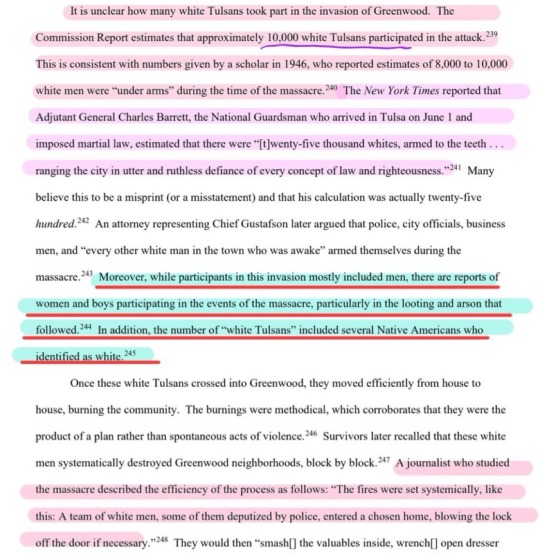
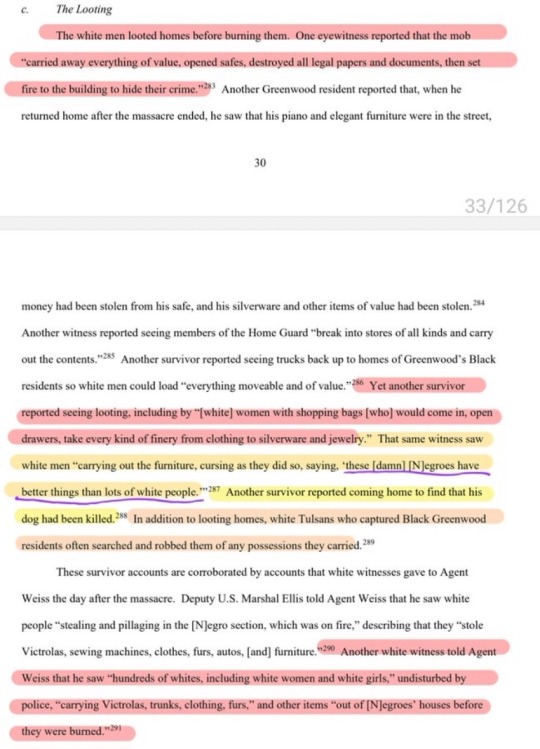
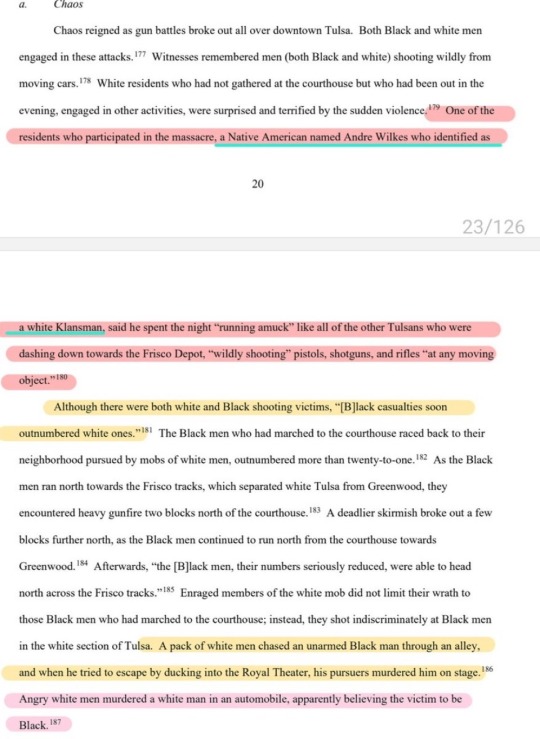
SOMEONE NEEDS TO FIND OUT WHAT TRIBE ANDRE WILKES BELONGED TO SO THEY CAN BE ADDED TO THE LIST WITH THE OTHER TRIBES THAT OWE ADOS REPARATIONS(Cherokee, Seminole, etc)
@queen-shiba
#blackblr#ados#african american#african american history#American descendants of slavery#soulaan#we knew the white people were horrible but the Native American tidbit is new#at this point#the ADOS reparations list is getting long with all the groups in it#honestly#the five tribes that enslaved black people live in Oklahoma#if I had to guess a likely suspect Andre Wilkes probably belonged to one of those five#tulsa oklahoma#tulsa race massacre
6 notes
·
View notes
Text
#Reconstruction-era#formerly enslaved people#Slavery#Reparations#Black Americans#enslavers#19th Century
4 notes
·
View notes
Text
Exposé: The Hidden History of Piracy and its Unspoken Legacy
Piracy has woven itself into the fabric of popular culture through tales of swashbuckling adventurers and treasure-filled islands. However, the historical reality of piracy extends far beyond these romantic narratives, revealing a complex tapestry of violence, exploitation, and the systemic enslavement of individuals. This exposé delves into the often-overlooked history of piracy, particularly…
#17th-century shipwreck#A Million Europeans Enslaved#articles on piracy#Barbary pirates#corsairs of the Mediterranean#cultural heritage of pirates#enslaved Europeans#European slavery#historical narrative of piracy#history of piracy#maritime archaeology#Mediterranean history#Murdo Fraser reparations#pirate ship discovery#reparations for slavery
0 notes
Text
Women pioneers of reparations
I’ve previously posted about Henrietta Wood. Here are some other early women pioneers for reparations.
Belinda Sutton
Belinda (Royal) Sutton was born in 1712 in Ghana. She was abandoned by her enslaver, who had offered emancipation upon his death or her transfer to his daughter. If she chose freedom he provided 30 pounds for three years so she wouldn’t be a public charge. In 1783, at 63 years old, Sutton filed a petition to the Massachusetts General Court requesting a pension from the estate of her former enslaver. In her petition she recalled her life in Africa as a joyful one full of love prior to her captivity and enslavement. Sutton’s testimony describing the happy times with family in Africa contradicted the narrative that the enslaved were happy in their captivity. She won her claim and was awarded 15 pounds and 12 shillings annually. She had to fight continuously for that award to be honored and paid.
Belinda Sutton’s […] petition of 1783 is among the earliest narratives by an African American woman. […] It has been seen by some commentators as the first call for reparations for American slavery [and] opens a rare window onto the life on an enslaved woman in colonial North America.
To read the full text of Belinda Sutton’s first petition, click here. All of her petitions are available through the Antislavery Petitions Massachusetts Dataverse, maintained by Harvard University.
Callie House
Callie House was born enslaved in Rutherford County, Tennessee, in 1861. In 1897, at 36 years old, she founded the National Ex-Slave Mutual Bounty and Pension Association (MB&PA) to seek financial support for former slaves left without resources. With Isiah Dickerson she traveled to former slave states to encourage others to join the organization. The organization was eager to petition Congress for a bill that would grant payments (reparations) and mutual aid for burial expenses. Their grass-roots advocacy grew in membership to hundreds of thousands of formerly enslaved residents all over the country. The government used three agencies to try to stop this movement: the Federal Bureau of Pensions, the Department of Justice and the Post Office Department. On September 1899, the Post Office issued a fraud order, without evidence, against MB&PA, which made it illegal for them to send mail, cash or money orders. House resisted by invoking the 1st, 14th and 15th amendments and hiring an attorney.
Congress rejected the pensions petition, as if it was not to be taken seriously, and postponed it indefinitely.
In 1909, when Dickerson died, House became the leader of the MB&PA. In 1915, under House’s leadership, the class action lawsuit Johnson v McAdoo was filed in U.S. Federal Court requesting reparations for slavery in the amount of $68 million. This amount was cotton tax money collected from 1862 to 1868 and held by the U.S. Treasury Department. A former slave, H. N. Johnson, led the charge as the plaintiff against U.S. Secretary of the Treasury William G. McAdoo. The U.S. Supreme Court denied the claim. This was the first documented litigation for reparations for American chattel slavery in a U.S. federal court.
The following year, House was arrested on charges of fraud from the Post Office, convicted by an all-white, all-male jury and sentenced to a year in jail, deliberately hampering the reparations movement.
Callie House died from cancer in Nashville, Tennessee on June 6, 1928, at the age of 67. Source: Greenbelt News Review, BlackPast.org, RoyallHouse.org
Visit www.attawellsummer.com/forthosebefore to learn more about Black history and read new blog posts first.
Need a freelance graphic designer or illustrator? Send me an email.
#Callie House#Henrietta Wood#National Ex-Slave Mutual Bounty and Pension Association#reparations#enslaved people#slavery#lawsuit#American history#black histoy#Belinda Sutton#Tennessee history#Massachusetts history
0 notes
Text

I knew that the Catholic Church via the Pope had authorized slavery in the 1400s, but I didn’t know that they had authorized the eradication, subjugation, etc, of African people. Somehow I never connected the two.

“We grant you [Kings of Spain and Portugal] by these present documents, with our Apostolic Authority, full and free permission to invade, search out, capture, and subjugate the Saracens and pagans and any other unbelievers and enemies of Christ wherever they may be, as well as their kingdoms, duchies, counties, principalities, and other property […] and to reduce their persons into perpetual servitude.”
These clearly refers to the lands along the coast of West Africa. By these decree, Pope Nicholas V conceded to the King of Portugal Afonso V and Prince Henry and all their successors, all their conquests of Africa, and reduction to perpetual servitude of all people deemed non-believers and enemies of Christ, and all their properties.
A significant subsequent concession given by Nicholas V in a brief issued to King Alfonso in 1454 extended the rights granted to existing territories to all those that might be taken in the future. Together with a second reference to some who have already been enslaved, this has been used to suggest that Nicholas sanctioned the purchase of black slaves from “the infidel”: “… many Guineamen and other negroes, taken by force, and some by barter of unprohibited articles, or by other lawful contract of purchase, have been … converted to the Catholic faith, and it is hoped, by the help of divine mercy, that if such progress be continued with them, either those peoples will be converted to the faith or at least the souls of many of them will be gained for Christ.”
This bull is currently conserved at the Institute of the National Archives of Torre do Tomba in Lisboa, Portugal, under the reference PT/TT/BUL/0007/29 and is fully translated to French in the book “le Péché du pape contre l’Afrique” (The Sin of the Pope against Africa) (éd. Al qalam, Paris, 2002) de Assani Fassassi, P. 10 – 21.
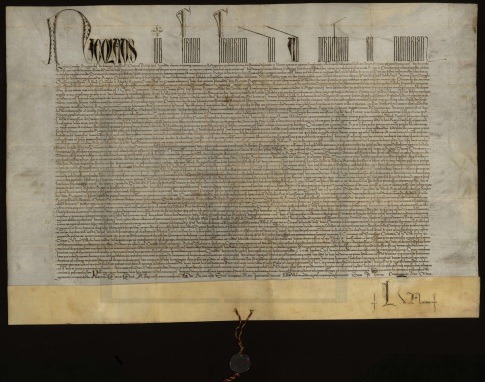
#catholics and slavery#pope nicholas v#dum diversas#Dum Diversas or The Vatican’s Authorization of Slavery#who started slavery of Africans#Enslaved Africans#catholic church is paying Reparations#Reparations
69 notes
·
View notes
Text
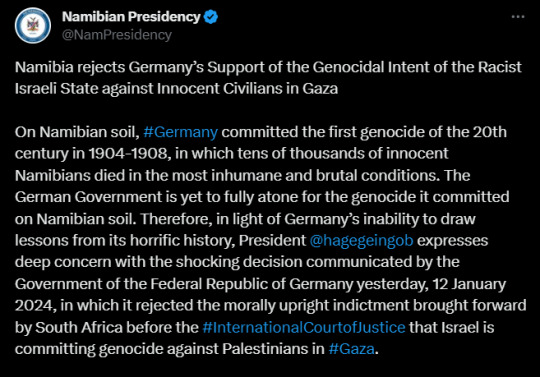

Namibian Presidency (official account), 13 Jan 2024
this comes after germany announced that they, in defense of israel, intend to intervene as a third party in the ICJ trial
in the official government statement, they argue that the accusations of genocide against israel "has no basis whatsoever," and declares themselves to be experts on recognizing genocide by virtue of the fact that they're the ones that committed the holocaust (yes, seriously)
small problem for our self-declared genocide experts though — it wasn't until 2021, over a hundred years after germany killed and enslaved tens of thousands of herero and nama people (in what is now present-day namibia), that the german state was willing to officially recognize that they had committed a genocide; a genocide where, about 80% of the indigenous population of the herero and nama people were wiped out, thousands were enslaved in concentrations camps (with death rates between 45 and 75 percent), and many hundreds medically experimented on.
here's a good article from al jazeera which lays out the history of the genocide, and why germany's offer of "reparations" were met with disgust and anger in namibia
this part, in particular, is worth highlighting:
Today, German Namibians make up 2 percent of Namibia’s 2.5 million population but own about 70 percent of the country’s land, most of it used for agriculture. Multiple state-led efforts to legally restore ancestral land to Indigenous peoples by buying land from private farmers have only partially succeeded because it has proven too expensive for the state. Although the Namibian government sought to transfer 43 percent (15 million hectares) of its total arable land to landless communities by 2020, it has only succeeded in acquiring about three million hectares.
#palestine#israel#gaza#south africa#germany#icj hearing#there's literally no country in planet earth that's less fit to speak of what constitutes a genocide than germany
4K notes
·
View notes
Text

Do you think most white people know white enslavers were paid reparations?
Especially the racist ones.
645 notes
·
View notes
Note
What if you cursed a demon to loyalty?
Could you tell it to stop all evil deeds and use its powers for good?
I mean ignoring the subjective nature of Good vs Evil then either the demon possesses no self-governance to begin with and should not be held accountable for wrongdoing, and by that same reasoning owes no reparations at its own expense, or it does have free will and enslaving it would be a violation of my own morality.
So, like. I guess it depends on whether a demon is a wild animal beholden to it's instincts, a force of nature that may be diverted but not suppressed, a servant pressed to take action on higher orders, an individual who has been taught a code of conduct different from my own, or a fully-informed individual who takes active steps to cause maximum harm.
If a demon is a creature that can be trained, like a horse, I suppose that harnessing it would be like any other mutualistic animal relationship where I would be responsible for its wellbeing and care, which seems like a big responsibility I'm not equipped for.
If a demon is a natural phenomenon, like a tornado, i think it would be less about me controlling it than it would be just learning what it does and using this to my advantage, like a wind turbine, and that frankly scares the shit out of me.
If a demon is indentured to a higher power, I'd feel obligated to offer it the tools to inform and liberate itself, then kind of hope it doesn't blow up in my face, which would not fall within the parameters of your question at all.
And if it is already a fully aware and self-governing force of a malicious nature that simply desires to encourage suffering, then I figure they wouldn't be a force I'd be inclined to rely on too heavily to begin with, rendering them essentially useless to me even if I was okay with controlling a sentient being.
So, uh. I guess no, I don't think I would, though I suppose somebody could. Just. Preferably someone stronger and smarter and kinder and ideally not me
TLDR: Nah but I might help it unionize idk
212 notes
·
View notes
Text

[id: screenshot of a tiktok of a woman with the text: while you’re struggling to pay your rent this month I just want you to remember that israel gets subsidized housing, subsidized groceries, free healthcare, updated infrastructure because the USA and Germany has given them multi billion dollars in citizen tax money.]
this is a dangerous narrative. the “im struggling to pay my rent because of my taxes and my taxes go to subsidize cushy lives in israel” is dangerous and a short logical leap from “jews are stealing our hard earned money. the working class and poor are oppressed by jews.”
and that’s not how the money works, much of it goes towards the military and “aid packages��� represent value not liquid cash (so weapons sent are represented in $$$ form.) and the state operates the way above bc ben gurion & co were socialists. plus, as far as i know, things are relatively similar to the uk with high costs of living but subsidized housing, public healthcare etc.
money from germany often does not go whatsoever into the pockets of israeli holocaust survivours (which is what it’s desiginated for as holocaust reparations (and bc companies that significantly contribute to the german GDP collaborated with nazis/used the labour of enslaved jews) ) (NOTE: it's military aid; money to compensate holocaust victims and survivors ended in 2018, which as i mentioned, did not go into individuals pockets) let alone israelis who are not survivours. many holocaust survivours living there live in poverty. there are literally videos of some picking through refuse produce.
it’s deeply heinous that palestinian american & palestinian german taxes go in part towards the weapons used to genocide palestinians including their own families. OP's post is not about that. she is not acknowledging that or really any connection between the USA and the occupation forces. instead OP is making it sound like israelis live comfortable lives with little expenditures off of the backs of american workers which is a few steps away from protocols shit at best. the idea that jews are enslaving or profitting off on those who are not jewish, especially the working class & poor, is textbook antisemitic conspiracy.
1K notes
·
View notes
Text
For Juneteenth I want to tell you about Sarah Boone: inventor of the modern ironing board, and the second Black women to receive a US patent.
Sarah was born into slavery in Craven County, North Carolina in 1832. Legally barred from education, her grandfather secretly taught her instead. In 1847 she married freedman James Boone, and was herself freed for unknown reasons. They moved to New Haven, Connecticut before the civil war, and had 8 children together.
James worked as a brick mason, and Sarah worked as a seamstress and dressmaker. While other inventors of the 19th century had been slowly improving the design of ironing boards, Sarah found them inadequate for the job, so she set about making something better.
She wrote in her very detailed patent,
"The purpose of the invention is to produce a cheap, simple, convenient and highly effective device, particularly adapted to be used in ironing the sleeves and bodies of ladies’ garments."
Her ironing board was narrow, curved, symmetrical, and tapered so that the narrowest parts of a garment could fit around it flatly without ceasing while easily turning the garment for each side. It was padded so the fabric would drape more gently, also reducing ceasing. It had collapsible legs that started towards the center of the board so that there was plenty of room for clothes to fit around it while also being mobile and easy to store. It was easy and cheap to manufacture so that it would be accessible for anyone to buy. Especially important when Black people were (are) both poorer and more harshly judged for their appearance.
She submitted she her patient in July of 1891, and obtained United States patent number 473,563 in April of 1892. 132 years later we are still using Sarah Boone's design with very few changes.
She died in 1904 at the age of 72 and is buried in the family plot in Evergreen Cemetery in New Haven.
So next time you iron something, admire how well thought out and purpose built Sarah's design is. Black excellence and freedom made that possible. If she'd remained in slavery she would never have been able to design it or patent it.
I'm thinking about her story today and mourning the generations of Black innovation we never got because of slavery. All that brilliance held back by such an evil and dehumanizing institution. All the Black innovation held back today due to the legacy of slavery and ongoing racism. The inmates who are still legally enslaved in this country and not given a chance to thrive and create. I'm thinking about how reparations could help other descendents of slavery have the money to work on their ideas. (Or just live other fulfilling lives because no one should have to be exceptional to be respected.)
I'm also thinking about how vital Sarah's ironing board has been to activist organizing. They're cheap, flat, long, fit in small crowded rooms, and historically everyone had one. The humble ironing board was vital to the Civil Rights movement, union organizing, and the queer rights movement among others. Ironing boards are an unsung hero of Black liberation.
Ironing boards are so simple that we never think about the care that went into their design or the woman behind them. But we should. And now you know the story.
294 notes
·
View notes
Text
'We found Too Many Slaves.' Harvard University began, informally, to research its relationship to slavery as early as 2007, when the history professor Sven Beckert started leading undergraduate research seminars such as the one Chen took. In 2016, then Harvard president Drew Faust acknowledged the university was “directly complicit” in slavery and, in 2022, the university released an official report, Harvard & the Legacy of Slavery, which detailed its history over more than a hundred pages.
Harvard is not the only academic institution with this burden. Currently more than 100 universities across the world are investigating their ties to slavery, the vast majority of which are in the US. A small subset of the universities researching their ties to slavery – approximately five – have committed to conducting genealogical research and identifying living descendants. Religious denominations such as the Episcopal church and the Evangelical Lutheran church and more than a dozen cities and four states have also begun researching their legacies of slavery. The California state reparations taskforce published a 1,000-page report two years ago, and state legislators have been developing – and passing – reparations-related initiatives.
The 2022 Harvard report included a list of recommendations by the presidential committee: develop educational partnerships with historically Black colleges and universities, create a public memorial, and – perhaps most contentiously – identify living descendants of people enslaved by university staff, leaders and faculty. The announcement was accompanied by a $100m endowment for “implementation”.
SOURCE: TheGuardian ⬇️
#blacktumblr#black history#black liberation#african history#nodeinoblackbusiness#buy black#harvard university#slavery
54 notes
·
View notes
Text
Blake History Month.

Ruby: *cuddling together with Jaune*
I so love being together with you, Jaune. ❤️
We are so totally the canon ship in the series, don't you think so too? 😀
Jaune: I don't know if we're canon or not.
But what I know for sure is that I love spending my time together with you.
Ruby: Oh Jaune~ Kiss me lover boy. 💋
*yank*
Blake: Oh no you don't.
Ruby: Blake! What the Salem is the matter with you?! 😡
Blake: The gub'ment cancel black history month. So now I'm thinking of celebrating my own black history month.
And for my first topic it will be titled "Reparation" as in I will be taking Jaune as compensation for my ancestor's enslavement.
*yoink*
Jaune: Wait, what just happened?
Blake: We'll see ya Ruby.
*whoosh*
Ruby: ....! No, wait Blake, come back here with my man! 😭
Monty said we can be together!
Jaune: Don't worry Ruby I will call you back to make sure I'm okay.
Blake: Not so fast Jaune.
After I'm done with him. Not even you want to have him back. Nya, ha, ha.
Jaune: Eeek!
Ruby: Curse you Blake! Curse this gub'ment for cancelling black history month!!!
127 notes
·
View notes
Text
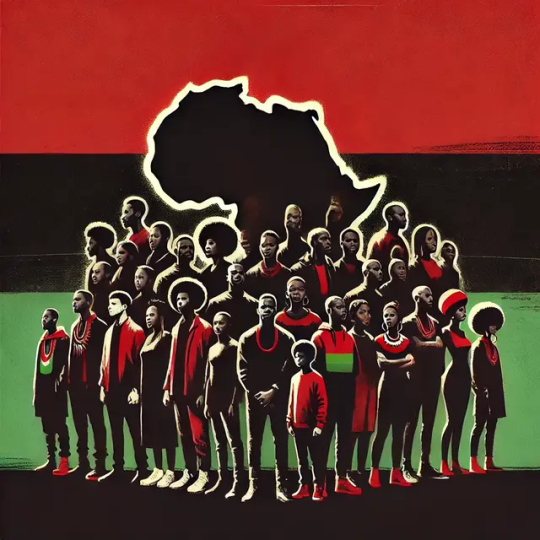
Diaspora Wars: A Garveyite Perspective on Why They Are Harmful, Counterproductive, and Unintelligent
From a Garveyite perspective, the so-called "Diaspora Wars"—the conflicts and divisions between Black people from different regions, including Africans, African Americans, Caribbeans, and Afro-Latinos—are one of the greatest obstacles to Black liberation. These internal conflicts are harmful, counterproductive, and completely unintelligent because they weaken Pan-African unity, make Black people easier to exploit, and distract from real issues like economic independence, nation-building, and global Black empowerment.
Marcus Garvey’s vision of Pan-Africanism was based on the idea that all Black people—regardless of where they were born—belong to one global African family and must work together to build a united Black world. Divisions based on nationality, culture, or colonial differences only serve white supremacy and prevent Black people from achieving true power.
This analysis will explore:
The origins of diaspora wars and why they were created to divide Black people.
Why diaspora conflicts benefit white supremacy and prevent Black progress.
The historical unity of Africans, African Americans, Caribbeans, and Afro-Latinos in resistance movements.
Why diaspora wars are based on misinformation and colonial brainwashing.
How Garveyism provides the only real solution to ending these divisions and building Black unity.
1. The Origins of Diaspora Wars: Divide and Conquer
A. Colonialism and Slavery Separated Black People on Purpose
The African diaspora exists because of slavery, colonialism, and forced migration, yet instead of seeing a shared struggle, many Black people have been programmed to see differences rather than commonality.
European colonizers and enslavers deliberately divided Black people by language, nationality, and region to prevent unity and resistance.
Black people were indoctrinated to believe that their struggles were unique and separate, rather than part of the same global fight against oppression.
Example: After slavery, Black Caribbeans were told that they were superior to African Americans because they were educated under the British system, while African Americans were told that Caribbean immigrants were outsiders taking their jobs. Meanwhile, both groups suffered under racist laws and economic oppression.
Key Takeaway: The division between Black people was never natural—it was created by white colonial powers to keep Black people weak and disorganized.
B. Nationalism Without Pan-Africanism Leads to Division
Many Black people today hold strong national identities (Nigerian, Jamaican, Haitian, African American, etc.), but these identities are often based on colonial borders that were drawn by white European powers.
Some Black people take pride in their specific nationality but reject Pan-African unity, which weakens the global Black struggle.
White-dominated countries encourage immigrants from different Black regions to assimilate into Western nationalism, causing them to see their fellow Black people as “foreigners” rather than family.
Example: Many Black people in the U.S. identify as American first, rejecting their African or Caribbean roots, even though America was built on the enslavement and exploitation of their ancestors.
Key Takeaway: Colonial borders and national pride should never come before Pan-African unity and global Black power.
2. Why Diaspora Wars Benefit White Supremacy and Prevent Black Progress
A. Black People Fighting Each Other Keeps Them Distracted from the Real Enemy
Instead of focusing on white supremacy, economic inequality, and global anti-Black racism, many Black people waste time attacking each other over accents, food, culture, and nationality.
While Black people argue over who has the “better” culture, white elites continue to control the global economy, media, and political systems.
A divided race can not fight for reparations, sovereignty, or economic independence, which is exactly what white supremacy wants.
Example: Instead of organizing for global Black wealth and political power, Black people spend time arguing about who suffered more—Africans under colonial rule or African Americans under Jim Crow. Meanwhile, both groups are still economically oppressed today.
Key Takeaway: While Black people fight over differences, white supremacy continues to win.
B. White Media Fuels Diaspora Wars to Keep Black People Divided
Hollywood, social media, and mainstream news intentionally amplify stereotypes and conflicts between Black people from different regions to promote division.
Films and TV shows often misrepresent African, Caribbean, and African American cultures, creating hostility instead of understanding.
Many social media influencers and celebrities promote division for attention and clout, rather than encouraging unity.
Example: When an African or Caribbean immigrant becomes successful in America, the media often promotes the narrative that African Americans are “lazy”, even though systemic racism affects all Black people. This fuels resentment and deepens division.
Key Takeaway: The system profits from Black division and will always promote stereotypes that make Black people hate each other.
3. The Historical Unity of Africans, African Americans, Caribbeans, and Afro-Latinos in Resistance Movements
While diaspora wars exist today, history proves that Africans, African Americans, Caribbeans, and Afro-Latinos have always worked together to fight oppression.
A. Pan-African Unity in Liberation Struggles
Haitian Revolution (1791-1804): Enslaved Africans from different tribes and regions united to defeat the French and establish the first Black republic.
Marcus Garvey’s UNIA (1914-1940s): Garvey built a movement that united Black people from Africa, the Caribbean, and America under one vision of Black sovereignty.
Anti-Colonial Movements (1950s - 1970s): Black leaders like Kwame Nkrumah (Ghana) and Jomo Kenyatta (Kenya) worked with African Americans to support liberation movements.
Example: Malcolm X travelled to Africa and the Caribbean to build alliances, proving that Black liberation is a global struggle, not just a national one.
Key Takeaway: When Black people unite, they win. When they divide, they lose.
4. Why Diaspora Wars Are Based on Misinformation and Colonial Brainwashing
Many of the stereotypes and insults used in diaspora wars come from colonial lies.
A. Stereotypes About African Americans, Africans, and Caribbeans Are False
“African Americans are lazy.” → FALSE. African Americans built America through slavery and fought for civil rights against extreme white violence.
“Africans sold other Africans into slavery, so they are responsible for the slave trade.” → FALSE. The transatlantic slave trade was organized, financed, and expanded by Europeans. African leaders who resisted were killed or overthrown.
“Caribbeans and Africans don’t care about racism in America.” → FALSE. Black Caribbeans and Africans have fought for Black rights in the U.S. for generations (e.g., Stokely Carmichael, Shirley Chisholm).
Example: The entire concept of “ADOS” (American Descendants of Slavery) and other groups with a similar ideology are created to divide Black people, making them reject Pan-African unity and reparations for all Black people.
Key Takeaway: The enemy is not other Black people—the enemy is white supremacy, colonialism, and economic control.
5. How Garveyism Provides the Only Real Solution to Ending Diaspora Wars and Building Black Unity
Marcus Garvey’s message was simple: Black people, no matter where they are from, must unite as one global nation.
A. Black People Must Prioritize Race Over Nationality
Being African, Caribbean, or African American should never come before being Black first.
The only way to defeat white supremacy is through global Black unity and power.
B. Focus on Black Economics, Not Petty Arguments
Instead of fighting online, Black people should focus on building Black businesses, investing in Africa, and developing Black-led economies.
Final Takeaway: Diaspora wars are a waste of time—true power comes from global Black unity.
Conclusion: Black People Must Unite or Stay Divided and Weak
Garvey said it best:
“Africa for the Africans, those at home and those abroad.”
It’s time to end the foolishness.
#black history#black people#blacktumblr#black tumblr#black#pan africanism#black conscious#africa#black power#black empowering#african diaspora#black diaspora#diaspora wars#black unity#black community#Garveyism#marcus garvey#blog
78 notes
·
View notes
Text
"But black people are not the only ones who were enslaved. Should descendants of all other groups who were enslaved receive reparations too?"
Yes. Everyone should receive reparations from the rich people who exploited them and continue to exploit them. All rich people should have to share their profits with the workers who made them rich.
But whenever anyone tries to do that, you fight tooth and nail against it.
306 notes
·
View notes
Text
Black Woman Won Largest Reparations Award at Time From U.S. Courts in 1878

In 1878, Henrietta Wood, a formerly “illegally” enslaved Black woman, was awarded $2,500 in reparations by an all-white jury — the most significant sum of its kind that a U.S. court had granted.
Wood initially sought $20,000 for being kidnapped and illegally enslaved in an 1870 lawsuit, Business Insider reported. But was awarded a smaller amount. While it may not seem like a lot, the $2,500 total would equate to more than $75,000 today, the outlet noted.
Wood used her settlement to move with her son, aiding his education. The outlet noted that he became one of the first Black law graduates from what is now Northwestern University’s School of Law.
Born into slavery between 1818 and 1820 in Kentucky, Wood was sold multiple times before finally gaining freedom in 1848 from her owner’s wife, Jane Cirode, who wanted to avoid debt collectors. According to Business Insider, the wife of William Cirode — a French immigrant who had abandoned his family due to legal reasons — had rented Wood out as a domestic servant.
Wood was illegally recaptured just five years later by a deputy sheriff in Kentucky named Zebulon Ward, whom Cirode’s daughter and son-in-law hired. Following the Civil War, Wood sued Ward for damages and won the most significant reparations case the U.S. courts had awarded.
The battle Wood began sadly continues with reparations still being denied to most African Americans. Now, more than a century later, federal reparations remain a question despite unprecedented Congressional apologies for slavery. In 2008-2009. Rep. Steve Cohen wrote in a resolution that the nation must seek “reconciliation, justice, and harmony.”
While state efforts have emerged, national progress stalls. Rep. Cori Bush said in May 2023: “Black people … cannot wait any longer for our government to … address the harm it has caused,” Business Insider reported.
Source: Black Enterprise, Wikipedia, Library of Congress
Visit www.attawellsummer.com/forthosebefore to learn more about Black history.
Need a freelance graphic designer or illustrator? Send me an email.
#Henrietta Wood#slavery#enslaved people#reparations#Black history#Northwestern University#Northwestern University School of Law#William Cirode#Brandon Hall in Mississippi.#Mississippi#history
1 note
·
View note